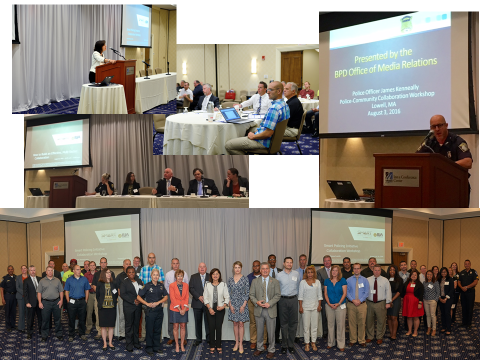In the Post-Ferguson era and as the concepts of procedural justice, collaborative reform, community outreach, and collaboration increase in importance for police agencies across the country, it is necessary and beneficial to integrate (or reintegrate) these concepts and practices into policing. In response, the Bureau of Justice Assistance (BJA) Smart Policing Initiative (SPI) conducted a series of regional workshops to discuss these important issues related to police-community collaboration.
On August 3-4, 2016, SPI held its third Community Collaboration Workshop, hosted at the Lowell, Massachusetts Police Department. The objectives of this workshop were to demonstrate the centrality of community collaboration and community policing in 21st-century policing, identify and discuss challenges and promising practices regarding gauging the community’s perspective on the police and crime issues, discuss strategies for sustaining successful police-community collaborations, based on lessons learned from SPI sites, and learn about technological options for enhancing and sustaining police-community collaborations and police accountability.
During the workshop, participants engaged in panel sessions and breakout groups, and received welcoming remarks and keynote presentations from United States Attorney Carmen Ortiz (District of Massachusetts), Mayor Edward J. Kennedy (Lowell, MA), Cornelia Sigworth (Associate Deputy Director, Bureau of Justice Assistance), Superintendent William Taylor (Lowell Police Department), and Commander Andre Anderson (Glendale Police Department and Special Assistant to the National Organization of Black Law Enforcement Executives (NOBLE)).
Throughout the workshop, attendees learned about challenges for building police-community collaboration and strategies to change police culture, sustain positive gains, and manage expectations.
Learn about SPI collaboration principles here.

